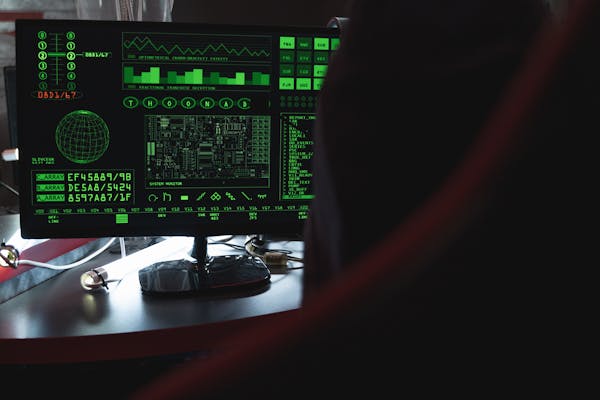Incoming and outgoing network monitoring and traffic management tools are called Firewalls. I will discuss what a firewall is, how it works, and why it is important to overall network security in my next article.

How do Firewalls work?
A firewall is a software- or hardware-based network security device that serves as a wall between the network and the Internet. Its main function is to control access to the network and protect it from outside interference and cyber threats.
Based on pre-set rules and regulations, a firewall can be configured to allow or prohibit a specific type of communication. In addition, it has the ability to scan web traffic and filter any traffic that contains malware such as viruses and worms.
According to the specified rules and regulations, the firewall analyzes incoming and outgoing network traffic to determine whether it should be allowed or denied. In addition, it is capable of deep packet inspection, which consists of inspecting each data packet to see if there are any malicious elements.
The application, transport, and network layers are just a few of the network layers that firewalls may be configured to operate. In addition, they can be configured to work in multiple ways, including status monitoring, packet filtering, and proxy service.
How Important is a Firewall to Network Security?
Because it helps prevent unauthorized access and cyber threats, cyber defense is an important part of network security. A network is open to attacks from malware, hackers, and other bad actors if it lacks internet security.
By monitoring and limiting access to sensitive data, a firewall can help prevent data breaches. It can be set to restrict access to specific websites and programs, as well as to stop data being sent outside the network.
A firewall can help protect against internal threats, such as illegal access by staff members or contractors, in addition to external threats. Based on user responsibilities and permissions, access to certain resources may be restricted.

Network security is not complete without a firewall, which helps protect against hacker attacks and illegal access. Based on pre-set rules and policies, it analyzes incoming and outgoing network traffic to decide whether it should be allowed or denied. Organizations can help ensure the security and integrity of networks and data by putting cyber defenses in place.
Network security is not complete without a firewall, which helps protect against hacker attacks and illegal access. Based on pre-set rules and policies, it analyzes incoming and outgoing network traffic to decide whether it should be allowed or denied. Organizations can help ensure the security and integrity of networks and data by putting cyber defenses in place.
A Brief History of Firewall?
It was first developed in the 1980s to protect networks from unauthorized access and cyber threats. Early firewalls were linear and used packet filtering to allow or deny network traffic.
Prestige monitoring was added to firewalls as the Internet evolved, enabling them to monitor network connection status and defend against attacks such as port scanning and denial-of-service attacks.
Internet defense is an important part of today’s network security, and it is constantly being improved to keep up with the changing threat environment. Deep packet inspection, application-level monitoring, and intrusion prevention are just a few of the functions found in modern firewalls.
Internet security services will continue to be essential for protecting networks and data from unwanted access and online attacks as Internet threats evolve. Organizations can make informed decisions about network security requirements and guarantee the integrity and security of their networks and data by understanding cyber defense developments over time.
HOW DO I GET A FREE FIREWALL?
Several firewall options are available to help protect your network from cyber threats, all for free. A few options are as follows:
Windows Firewalls:
Your computer can be protected from unwanted access with the help of internet protection that is already included in Windows operating systems. It may be configured to restrict or allow certain types of traffic and is free and easy to use.
free ones:
ZoneAlarm is a popular free internet security tool with cutting-edge features including application management, identity protection, and phishing protection. Real-time protection against cyber attacks is provided, and installation and configuration are easy.
Comodo :
Comodo Firewall is a free firewall that offers cutting-edge capabilities including cloud-based scanning, sandboxing, and intrusion prevention. It also has a user-friendly interface with movable settings that can help protect your network from online threats.
A free, open-source tool called pfSense can be used to protect your network from online threats. It has cutting-edge capabilities such as load balancing, multi-WAN support, and VPN, and can be customized to suit the unique requirements of your network.
While free internet firewalls can provide some basic network security, it’s important to remember that they may not offer the same level of security and features as commercial firewall options. To give your network the best possible protection, it’s important to make sure your firewall is properly set up and updated to the latest security patches.
WHICH IS THE BEST FIREWALL?
It is difficult to determine which type of internet protection is the best because each type has its own strengths and weaknesses and is created to meet specific security requirements. Your unique network security needs, your budget, and other requirements will determine the type of internet protection that is right for you.
However, next-generation firewalls (NGFWs) are among the best and most powerful types of firewalls currently on the market. NGFWs can provide comprehensive protection against modern cyber threats and have advanced features including deep packet inspection, application-level inspection, intrusion prevention, and sandboxing.
Ended.
hardware-based network security device that serves as a wall between the network and the Internet. Its main function is to control access to the network and protect it from outside interference and cyber threats.
Based on pre-set rules and regulations, a firewall can be configured to allow or prohibit a specific type of communication. In addition, it has the ability to scan web traffic and filter any traffic that contains malware such as viruses and worms.
According to the specified rules and regulations, the firewall analyzes incoming and outgoing network traffic to determine whether it should be allowed or denied. In addition, it is capable of deep packet inspection, which consists of inspecting each data packet to see if there are any malicious elements.
The application, transport, and network layers are just a few of the network layers that firewalls may be configured to operate. In addition, they can be configured to work in multiple ways, including status monitoring, packet filtering, and proxy service.
Because it helps prevent unauthorized access and cyber threats, cyber defense is an important part of network security. A network is open to attacks from malware, hackers, and other bad actors if it lacks internet security.
By monitoring and limiting access to sensitive data, a firewall can help prevent data breaches. It can be set to restrict access to specific websites and programs, as well as to stop data being sent outside the network.
this can help protect against internal threats, such as illegal access by staff members or contractors, in addition to external threats. Based on user responsibilities and permissions, access to certain resources may be restricted.
which helps protect against hacker attacks and illegal access. Based on pre-set rules and policies, it analyzes incoming and outgoing network traffic to decide whether it should be allowed or denied. Organizations can help ensure the security and integrity of networks and data by putting cyber defenses in place.
which helps protect against hacker attacks and illegal access. Based on pre-set rules and policies, it analyzes incoming and outgoing network traffic to decide whether it should be allowed or denied. Organizations can help ensure the security and integrity of networks and data by putting cyber defenses in place.
It was first developed in the 1980s to protect networks from unauthorized access and cyber threats. Early firewalls were linear and used packet filtering to allow or deny network traffic.
enabling them to monitor network connection status and defend against attacks such as port scanning and denial-of-service attacks.
Internet defense is an important part of today’s network security, and it is constantly being improved to keep up with the changing threat environment. Deep packet inspection, application-level monitoring, and intrusion prevention are just a few of the functions found in modern firewalls.
Internet security services will continue to be essential for protecting networks and data from unwanted access and online attacks as Internet threats evolve. Organizations can make informed decisions about network security requirements and guarantee the integrity and security of their networks and data by understanding cyber defense developments over time.
Several firewall options are available to help protect your network from cyber threats, all for free. A few options are as follows:
Windows Firewalls:
Your computer can be protected from unwanted access with the help of internet protection that is already included in Windows operating systems. It may be configured to restrict or allow certain types of traffic and is free and easy to use.
free ones:
ZoneAlarm is a popular free internet security tool with cutting-edge features including application management, identity protection, and phishing protection. Real-time protection against cyber attacks is provided, and installation and configuration are easy.
Comodo :
Comodo Firewall is a free firewall that offers cutting-edge capabilities including cloud-based scanning, sandboxing, and intrusion prevention. It also has a user-friendly interface with movable settings that can help protect your network from online threats.
A free, open-source tool called pfSense can be used to protect your network from online threats. It has cutting-edge capabilities such as load balancing, multi-WAN support, and VPN, and can be customized to suit the unique requirements of your network.
While free internet firewalls can provide some basic network security, it’s important to remember that they may not offer the same level of security and features as commercial firewall options. To give your network the best possible protection, it’s important to make sure your firewall is properly set up and updated to the latest security patches.
WHICH IS THE BEST FIREWALL?
It is difficult to determine which type of internet protection is the best because each type has its own strengths and weaknesses and is created to meet specific security requirements. Your unique network security needs, your budget, and other requirements will determine the type of internet protection that is right for you.
However, next-generation firewalls (NGFWs) are among the best and most powerful types of firewalls currently on the market. NGFWs can provide comprehensive protection against modern cyber threats and have advanced features including deep packet inspection, application-level inspection, intrusion prevention, and sandboxing.
What is Firewall?
A firewall is a software- or hardware-based network security device that serves as a wall between the network and the Internet. Its main function is to control access to the network and protect it from outside interference and cyber threats.
Based on pre-set rules and regulations, a firewall can be configured to allow or prohibit a specific type of communication. In addition, it has the ability to scan web traffic and filter any traffic that contains malware such as viruses and worms.
How do Firewalls work?
According to the specified rules and regulations, the firewall analyzes incoming and outgoing network traffic to determine whether it should be allowed or denied. In addition, it is capable of deep packet inspection, which consists of inspecting each data packet to see if there are any malicious elements.
The application, transport, and network layers are just a few of the network layers that firewalls may be configured to operate. In addition, they can be configured to work in multiple ways, including status monitoring, packet filtering, and proxy service.
How Important is a Firewall to Network Security?
Because it helps prevent unauthorized access and cyber threats, cyber defense is an important part of network security. A network is open to attacks from malware, hackers, and other bad actors if it lacks internet security.
By monitoring and limiting access to sensitive data, a firewall can help prevent data breaches. It can be set to restrict access to specific websites and programs, as well as to stop data being sent outside the network.
A firewall can help protect against internal threats, such as illegal access by staff members or contractors, in addition to external threats. Based on user responsibilities and permissions, access to certain resources may be restricted.
Network security is not complete without a firewall, which helps protect against hacker attacks and illegal access. Based on pre-set rules and policies, it analyzes incoming and outgoing network traffic to decide whether it should be allowed or denied. Organizations can help ensure the security and integrity of networks and data by putting cyber defenses in place.
Network security is not complete without a firewall, which helps protect against hacker attacks and illegal access. Based on pre-set rules and policies, it analyzes incoming and outgoing network traffic to decide whether it should be allowed or denied. Organizations can help ensure the security and integrity of networks and data by putting cyber defenses in place.
It was first developed in the 1980s to protect networks from unauthorized access and cyber threats. Early firewalls were linear and used packet filtering to allow or deny network traffic.
Prestige monitoring was added to firewalls as the Internet evolved, enabling them to monitor network connection status and defend against attacks such as port scanning and denial-of-service attacks.
Internet defense is an important part of today’s network security, and it is constantly being improved to keep up with the changing threat environment. Deep packet inspection, application-level monitoring, and intrusion prevention are just a few of the functions found in modern firewalls.
Internet security services will continue to be essential for protecting networks and data from unwanted access and online attacks as Internet threats evolve. Organizations can make informed decisions about network security requirements and guarantee the integrity and security of their networks and data by understanding cyber defense developments over time.
Several firewall options are available to help protect your network from cyber threats, all for free. A few options are as follows:
Your computer can be protected from unwanted access with the help of internet protection that is already included in Windows operating systems. It may be configured to restrict or allow certain types of traffic and is free and easy to use.
free ones:
ZoneAlarm is a popular free internet security tool with cutting-edge features including application management, identity protection, and phishing protection. Real-time protection against cyber attacks is provided, and installation and configuration are easy.
Comodo :
Comodo Firewall is a free firewall that offers cutting-edge capabilities including cloud-based scanning, sandboxing, and intrusion prevention. It also has a user-friendly interface with movable settings that can help protect your network from online threats.
A free, open-source tool called pfSense can be used to protect your network from online threats. It has cutting-edge capabilities such as load balancing, multi-WAN support, and VPN, and can be customized to suit the unique requirements of your network.
While free internet firewalls can provide some basic network security, it’s important to remember that they may not offer the same level of security and features as commercial firewall options. To give your network the best possible protection, it’s important to make sure your firewall is properly set up and updated to the latest security patches.
It is difficult to determine which type of internet protection is the best because each type has its own strengths and weaknesses and is created to meet specific security requirements. Your unique network security needs, your budget, and other requirements will determine the type of internet protection that is right for you.
However, next-generation firewalls (NGFWs) are among the best and most powerful types of firewalls currently on the market. NGFWs can provide comprehensive protection against modern cyber threats and have advanced features including deep packet inspection, application-level inspection, intrusion prevention, and sandboxing.




